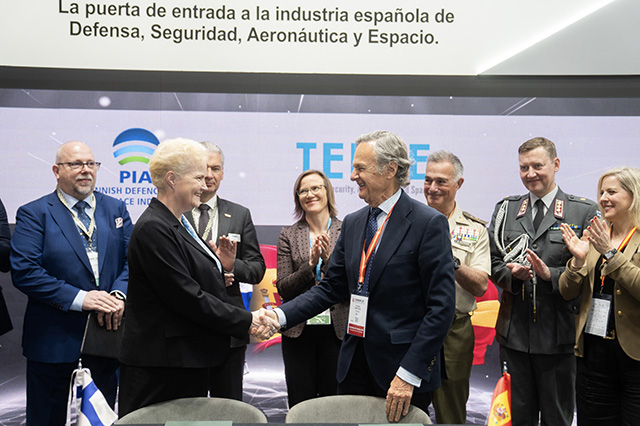Ricardo Martí Fluxá, president of TEDAE, the Spanish Association of Defense, Security, Aeronautics, and Space Technology Companies, presented at FEINDEF 25 the results of the study, Social Perception in Spain on Security and Defense, prepared by GAD3 for TEDAE.
According to the report, more than half of Spaniards (56%) believe that the world will be less secure and stable within five years. Despite this, six out of ten respondents maintain a relatively optimistic outlook in terms of sustainability, prosperity, and democracy. The report also reveals an increase in the sense of threat surrounding armed conflicts, climate change and natural disasters, cyberattacks, and trade wars.
Security and Defense is the third priority issue of concern to Spaniards, after access to housing and economic stability. Regarding defense investment, 37% of citizens consider the current budget insufficient, and 52% would be in favor of increasing defense spending. Fifty-one percent of respondents believe that increased defense investment would strengthen national security, and up to 35% believe it would increase the creation of skilled jobs. It is worth noting that 31% of the Spanish population believes that this increase in investment would increase the civilian application of military technologies (dual use).
Regarding its international role, 53% of respondents believe Spain should maintain its current role within NATO, while 27% even support increasing its collaboration.
The defense industry is also valued for its ability to generate economic and social benefits. Fifty-eight percent of respondents believe it drives technological innovation, while 54% highlight its contribution to industrial development. Citizens also demand greater transparency: eight out of ten people ask for clearer communication with citizens.
Regarding the degree of preparedness for these challenges, half of those surveyed believe the European Union is well-equipped to face these threats, while only 33% believe Spain is prepared. Regarding the assessment of sector stakeholders, the National Police, the Civil Guard, and the Armed Forces are perceived as the agencies that act most for the benefit of citizens, followed by the European Union and the technology industry.
Finally, regarding public perceptions of the future of militaries, 40% believe they will continue to be necessary as they are now, compared to 30% who believe they will need to be transformed to adapt to new hybrid threats. The options of limiting their functions, privatizing them, or eliminating them are viewed as unlikely by those surveyed.
Signing of Agreements
Within the framework of FEINDEF 25, TEDAE also signed memoranda of understanding (MoUs) with the Hellenic Defense Manufacturers Association (SEKPY) and the Finnish Defense and Aerospace Industries Association (PIA) to strengthen international industrial cooperation. The agreement with SEKPY seeks to promote the exchange of relevant information on legislation, regulations, market trends, and best practices; reciprocal assistance to member companies in identifying potential partners for collaborative projects; and the coordination of joint activities, such as seminars, trade missions, or sectoral conferences, when mutually beneficial.
For its part, the agreement with PIA focuses on strengthening the industry's competitiveness and its position within the European Defense Technology and Industrial Base (EDTIB). This agreement will allow for the sharing of information on topics of interest related to the defense and security industry, including European policies, as well as information among its member companies, and will allow for the exploration of collaboration opportunities.
Likewise, yesterday, TEDAE signed a Memorandum of Understanding (MoU) with the Ministry of Economy and Industry of the Xunta de Galicia and with the Círculo Foundation for Defense and Security Technologies to promote the development of the Defense, Aerospace, and Security industries.
The agreement with the Xunta de Galicia establishes a series of joint actions for the internationalization, competitiveness, and development of Galician companies, the promotion of talent, the development of specific programs, the exchange of strategic information, and joint participation in international fairs under the umbrella of the Spanish Pavilion.
For its part, the agreement with the Círculo Foundation establishes a framework for collaboration to coordinate actions and efforts in the development of technologies in the areas of Defense. The agreement includes initiatives aimed at SMEs and startups, such as the joint organisation of a Defence Culture Course and a mentoring programme. Both entities will also collaborate in participating in international trade fairs under the Spanish Pavilion. It also includes the coordination of various events, conferences and seminars.







